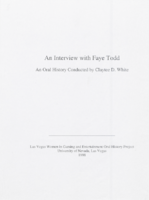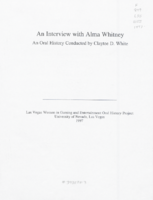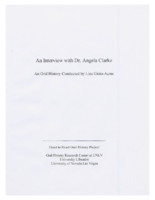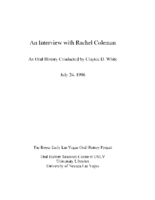Search the Special Collections and Archives Portal
Search Results

Transcript of interview with Faye Todd by Claytee D. White, October 15, 1996
Date
Archival Collection
Description
Interview with Faye Todd conducted by Claytee D. White on October 15, 1996. Featured in Ebony Magazine in 1979, Todd achieved executive status in the Las Vegas gaming industry, serving as Special Events Coordinator for Desert Inn Hotel and Casino and Entertainment Director/Corporate Executive Assistant for Landmark Hotel and Casino.
Text

Transcript of interview with Alma Whitney by Claytee D. White, March 3, 1996
Date
Archival Collection
Description
Interview with Alma Whitney conducted by Claytee D. White on March 3, 1996. Seeking better employment opportunities, Whitney moved to Las Vegas from Tallulah, Louisiana, at the age of sixteen. Whitney supported Westside churches and schools and was respected as supervisor in housekeeping at Desert Inn. Whitney provides information on the African American migration to Las Vegas during the 1940s, post-war race relations in Las Vegas, the daily work of hotel maids, and the Culinary Union.
Text
Audio recording clip of Interview with Eddie & Johnie Wright
Date
Archival Collection
Description
Part of an interview with Eddie Wright, Jr. by Leon Green in the fall of 2012. Wright talks about his different jobs and the part his race played in getting jobs in the workforce.
Sound

Gwen Weeks Rahner interview, March 06, 1981: transcript
Date
Description
On March 6, 1981, Laronda D. Tinsley interviewed Gwendolyn Weekes Rahner (born August 14th, 1923 in Atlantic City, New Jersey) at her home in Las Vegas, Nevada. In this interview, Mrs. Rahner discusses working in politics and registering people to vote in Las Vegas, Nevada. She also discusses living in West Las Vegas and her experiences there.
Text

Transcript of interview with Dr. Angela Clarke by Lisa Gioia-Acres, October 3, 2008
Date
Archival Collection
Description
Interview with Dr. Angela Clarke conducted by Lisa Gioia-Acres on October 3, 2008. A native of Baltimore, Maryland, Clarke spent a great deal of time reading medical texts and started working at Social Security by the age of fourteen. Following high school, she joined the women's Air Force and attended Morgan State College on the GI Bill. Clarke recalls instances of racism and the efforts she personally made to mitigate or change circumstances for blacks. Among her many awards, she was given a plaque for integrating Air Force swimming pools. Later accepted at University of Maryland, her first year's tuition was paid by the Jessie Smith Noyes Foundation. Clarke lived and practiced medicine in Beverly Hills until 1976, when a friend suggested that she was needed in Las Vegas as a board-certified family practitioner.
Text

Transcript of interview with Rachel Coleman by Claytee D. White, July 24, 1996
Date
Archival Collection
Description
Interview with Rachel Coleman conducted by Claytee D. White on July 24, 1996. Born in Fayette, Mississippi, Coleman moved to Las Vegas in the 1950s and began washing dishes at the Tropicana. In 1969, having worked for a number of hotels, she was promoted to executive housekeeper at The Hacienda. She ran for president of the Culinary Workers Union Local 226 in 1987. Coleman recalls Las Vegas race and labor relations through the decades.
Text

Transcript of interview with Rev. Marion D. Bennett, Sr. by Claytee D. White, January 12, 2004
Date
Archival Collection
Description
Interview with Rev. Marion D. Bennett, Sr. conducted by Claytee D. White on January 12, 2004. Bennett grew up in Greenville, South Carolina and graduated from Morris Brown College before earning his Master of Divinity from the Interdenominational Theological Center in Atlanta. He moved to Las Vegas in 1960 to pastor Zion United Methodist Church, ultimately growing his congregation to over six hundred members. Bennett speaks candidly about the racial tension that the Las Vegas community endured during integration and his fight to establish the Equal Rights Commission in Nevada. In 1973, he ran for the Nevada State Assembly and served for ten years, focusing on quality education and employment along with healthcare and equal rights.
Text

Transcript of interview with Robert Brown by Ian McLaughlin, February 23, 1981
Date
Archival Collection
Description
Text

Transcript of interview with Michael Tell by Barbara Tabach, January 6, 2018
Date
Archival Collection
Description
Michael Tell, the youngest son of Jack and Beatrice Tell, is the publisher of the Las Vegas Israelite newspaper and the second generation of ownership. He briefly traces his Jewish ancestral roots back to Eastern European grandparents who settled in New Jersey and New York. He became a bar mitzvah in a conservative Jewish synagogue in New York City. At age sixteen, he accompanied his father, Jack Tell, westward to Nevada. The elder Tell was in pursuit of owning a newspaper and Mike was a perfect companion as Jack took over ownership of the Territorial Enterprise. Mike recalls it was a short lived venture and the family settled in Las Vegas, where his father went to work for Hank Greenspun at the Las Vegas Sun and then for Henderson Home News, owned by Morry Zenoff. In 1965, Jack Tell opened the Las Vegas Israelite. Meanwhile, Mike explored the lucrative business of concert promotions and opened a teen nightclub 1961 called the Twin Lakes Twist. He hired such talents of the era as Bobby Darin and Wayne Newton. Soon his business acumen grew and he moved Mike Tell Productions to Los Angeles. He tells the story of his last concert, booking Al Green, and being held at gunpoint. Then in 1979, he returned to work at the Israelite, which had a circulation of about 2000. The Jewish community was beginning to show signs of growth. He recalls running an ad in 1992 for High Holy Days services to be held at the Aladdin hotel. He used the word “Lubavitvh” in the ad and this sparked an interest in Las Vegas from the Chabad movement. He also recalls anti-Semitic episodes in Las Vegas, such as Ralph Englestad’s Hitler birthday parties and the presence of Skinheads. And he reflects on the changes in the community that he has observed over the decades.
Text
